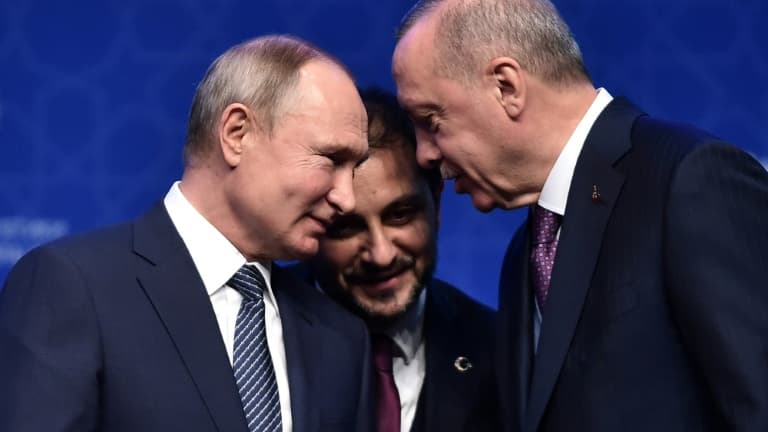The Kremlin this Wednesday condemned the US’s “unprecedented pressure” on Turkey to abandon Russia’s Mir payment system, which is used in a handful of countries around the world, fearing strong US retaliation.
Caught between Washington and Moscow, Turkey abandoned the Russian mir tariff for fear of US retaliation, which Moscow denounced as “unprecedented pressure” from the US.
“The payments are ongoing, but a date has been set,” a senior Turkish official told AFP on Wednesday, speaking on condition of anonymity and without giving a date, to suspend the Mir system.
The three public banks involved – Halkbank, Zirat and Vakifbank, which did not comment on Wednesday – have so far authorized transactions with the Russian entity, particularly withdrawals.
“Under unprecedented pressure” from Washington
The country’s two largest private banks, Denisbank and Isbank, had already announced last week that they would stop using it.
For the Kremlin, spokesman Dmitry Peskov charged that “this decision was made under unprecedented pressure” from Washington.
Recognizing a “Critical Situation”. Turkish banks They are now “threatened by US sanctions,” he appealed to Turkish partners.
“We need to find ways together to counter this pressure without harming our trade and economic cooperation,” he suggested.
The operation of Mir bank cards is now limited to a few countries near Moscow, including Belarus – on Friday, Uzbekistan already abandoned Mir, citing “technical” reasons.
Addiction and Mediation
Dependent on Russian gas and oil, Turkey has refused to join Western sanctions imposed against Russia after its invasion of Ukraine, while tirelessly offering to mediate between Moscow and Kiev.
The country, a popular destination for Russian citizens, has seen an influx of thousands since the start of the war, with tourists, refugees and businessmen becoming buyers of real estate in Turkey since May.
After a meeting between President Recep Tayyip Erdogan and his Russian counterpart Vladimir Putin in early August, Ankara announced the expansion of the Mir system’s scope.
The two leaders agreed to supply Russian gas to Turkey and pay for one-fourth in roubles. But Washington immediately warned Turkish companies and banks doing business with Russia against possible sanctions.
In mid-September, the United States announced sanctions against senior officials of the Russian banking system, including Mir chairman Vladimir Komlev. Since then, the Turkish regime appears to have distanced itself from the Kremlin: before the United Nations, Mr. Erdogan called for a “dignified exit for all” from the conflict in Ukraine.
Then, last week, the Turkish Foreign Ministry condemned Russia’s “illegal” referendum on four Ukrainian regions under its control.
On Tuesday, US Secretary of State Anthony Blinken threatened Russia with new “severe” sanctions.
“There Will Be Consequences”
“Fear of secondary sanctions is starting to work. Turkish banks abandon Putin’s Mir payment system for fear of US sanctions,” British financier Bill Broder, head of the fund, responded on Twitter on Wednesday. Hermitage Capital Investment.
“The Chinese, UAE, Indians and many other countries need to understand that there will be consequences for continuing to trade with Moscow,” the anti-corruption campaigner said after suffering a backlash in Russia.
Created in 2015 in the face of Western sanctions after the annexation of Crimea in 2014, Mir cards — which mean “world” and “peace” in Russian — allow Russians to make payments and withdraw money in some foreign countries.
In the wake of the Ukraine attack, global bank card giants Visa and MasterCard quickly suspended operations in Russia, blocking cards issued by Russian banks from operating outside the country and foreign cards from operating in Russia.

“Tv expert. Writer. Extreme gamer. Subtly charming web specialist. Student. Evil coffee buff.”




/cdn.vox-cdn.com/uploads/chorus_asset/file/25550621/voultar_snes2.jpg)


More Stories
At least two children have died and eleven others have been injured in a stabbing attack in Southport
Video. ‘It’s unbelievable’, ‘menacing black spots in the water’: Thousands of dragonflies invade a beach and surprise bathers
Donald Trump Tells Christian Voters If He’s Elected, They “Don’t Have To Vote Anymore”